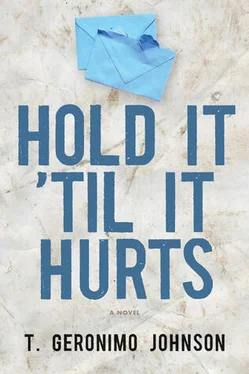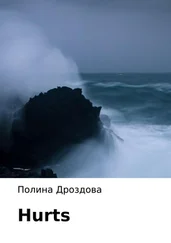But what he was really thinking about was his brother the prankster. Troy had once mixed red Kool-Aid in the tub and lain there for hours waiting for someone to find him. Their mother flipped. The stain didn’t come out for weeks. Achilles had always wanted to be the hero, to be lauded, to be idolized, until now. The more everyone spoke about Troy as a hero, the less real he became.
The preacher talked about “the Word,” as had the preacher at Wages’s funeral, and just as suddenly as he had started, he stopped talking and nodded at the three soldiers standing at attention fifty yards away. There were too few buglers and too many funerals, even this close to Washington, so the soldier at the far end solemnly leaned over and turned on a boombox. “Taps” played. His mother and Ines hissed gently at him for squeezing their hands too tightly. When the song was over, the same soldier leaned over and turned off the boombox. Achilles braced himself for the coming twenty-one gun salute, the seven volleys that would echo across town. At his father’s funeral, he had flinched six times. This time he breathed purposefully, and his heart didn’t miss a beat, not when they folded the flag and presented it to his mother, not when they lowered the coffin.
But when his mother held his hand for support as she bent for her own handful of dirt, and she said, “Thank you for bringing your brother home,” he was seized by a momentary desire to take it back. His mother had asked one time, “Are you sure? How do you know? Are you absolutely sure?” He threw his handful of dirt on the coffin, and his aunts and Ines followed suit, each handful rattling less until soon you couldn’t even hear it fall, the line so long it seemed there wasn’t enough dirt in the world.
The entire town converged on the VFW after the service, including those who hadn’t been at the funeral, resulting in a crowd thicker than the Fourth of July cookouts. Even with every window as well as both doors open, the bar was hot and sticky. He saw friends from high school he scarcely recognized. It had only been three years since he enlisted, but it felt as if he’d aged a lifetime. They patted him on the back and expressed condolences, averting their eyes as they segued into the next question or an innocent congratulation: Man, you did it. You went and did it, and came back.
That could have been Achilles telling the same jokes and making the same faces, huddled up with the football players who positioned themselves fifty yards from the girls, while sneaking sidelong glances and talking loudly enough to be heard across the parking lot. The girls, in their own cluster, stood with their backs to the boys, taking turns glancing over their shoulders and blushing whenever they made eye contact. All they were missing was corsages. If he had stayed, he would be hiding out behind the dumpster smoking cigarettes and then sucking up to Troy, asking him, as a Randall, Jarrell, and Howie asked Achilles, “Did you get to kill anybody?”
He might have responded differently to “have to,” but as much as he appreciated the attention, he could only shrug in response to “get to.”
He saw Ken and Ken’s mom, who still looked sexy, wearing her hair like Farah Fawcett had on Charlie’s Angels, a look that was back in style. Sam, the Chinese kid he used to play with, was home for the holidays. They spoke briefly, and Achilles learned that Sam had spent a few years in Korea, which was where he was actually from. The recruiter was there, which surprised his mother because, Three of them killed themselves you know. The guilt. Achilles wanted to explain that the recruiters had only said what they’d wanted to hear.
“She’s like a hostess,” she said, pointing to Ines.
She was right. Ines moved through the crowd with ease, talking to all who listened, listening to all who talked, so comfortable you would have thought she had lived there her entire life. And when she wasn’t talking, she was tending to his mother. Achilles said, “She likes to tell people what to do.”
“That’s exactly what you need,” said his mother.
“How do you mean?”
“You know what I mean,” she said.
When people offered their condolences, his mother managed to reassure them, to make them feel better, as if they were the grievers, except for the recruiter, whom she refused to directly acknowledge.
“I am deeply sorry, ma’am,” the recruiter said.
“I know.” Quoting the officer who had given her the flag, she said, “‘This flag was offered by a grateful nation in memory of faithful service performed by your loved one.’”
“I’m real sorry,” the recruiter repeated himself. “That was moving, what you said, Achilles.”
“I know. My son is smart. That’s why I wanted him to go to college.”
When the recruiter left, his mother said, “You know four of them killed themselves.”
“I thought you said three.”
“Did I? Wishful thinking.” She pointed. “Look, it’s that woman.”
Three teachers were clustered at the end of the bar, among them Troy’s tenth-grade math teacher, who looked devastated. As Mrs. Delesseppes once said, grief ages a person.
His mother cradled the flag like a child, her expression reminiscent of Mrs. Robicheaux, whom they’d found on that roof. He reached out and touched her face. “I love you, Mom.”
She turned to him. “I know you do. I love you too, sweetie.” She put the flag back on the table, arranging it so that it pointed away from her. “It fits there, with all the stains and burns, doesn’t it?
“Yes.”
“I never liked this bar. The last thing a bunch of old veterans need to do is get drunk. But I guess this is a celebration of his life? Is this like New Orleans?”
“Exactly,” said Achilles.
“I hoped it would be. They wanted to have a parade when you got back, but it just wasn’t the right time. I understand your reluctance to take that envelope now. You think you want to know, but you don’t. You don’t. You don’t want them to be in a better place, you want them to be with you.”
A better place. Everyone had said that, even at his father’s funeral. He hadn’t noticed as much, being only twenty-four hours out of combat. Besides it was easy enough to ignore because no one said it to his face, as if they knew Achilles wasn’t buying. Once you were shot at, there was no better place to be than alive. A bead of sweat dripped from his nose and he decided to go outside for air. He looked back as he passed through the doorway. Ines was already at his mother’s side, like all that time she had just been waiting for him to leave.
The kids behind the dumpster stopped laughing and tossed their cigarettes upon Achilles’s approach. Hausman, the tall ROTC pallbearer, was among them. “I hope those weren’t your last ones,” said Achilles.
The kids relaxed and picked up their cigarettes, offering one to Achilles. They smoked in silence, Hausman watching Achilles out of the corner of his eye.
“What’s up?” asked Achilles.
“Nothing, just telling a joke,” said the young one; Bridges, according to his nameplate. Achilles recalled the shock on his face when they lifted the coffin, so light it seemed to float on air.
“Let’s hear it,” said Achilles. He had to prompt him a few more times, but Bridges finally resumed his story, catching Achilles up first. “There were these two scientists, see, a Russian and a Czech, and they both wanted to study grizzly bears. They’d loved bears all their lives, but there weren’t any bears where they lived. So they got permission to go to Alaska. The park ranger in Alaska told them that they could go to the national park, but they’d be on their own.”
Hausman was staring at the ground, his face red. “There aren’t any grizzly bears in Alaska. They live primarily in the Pacific Northwest.”
Читать дальше












